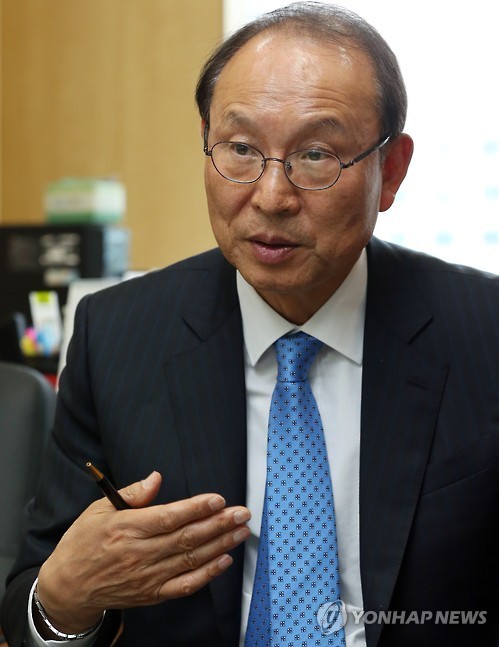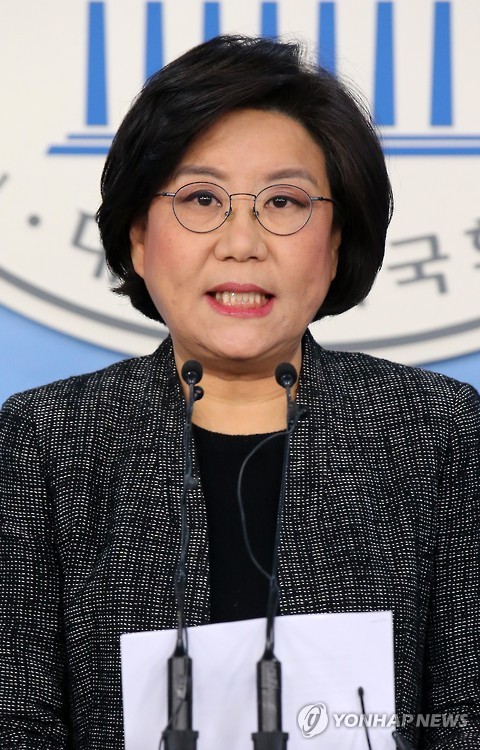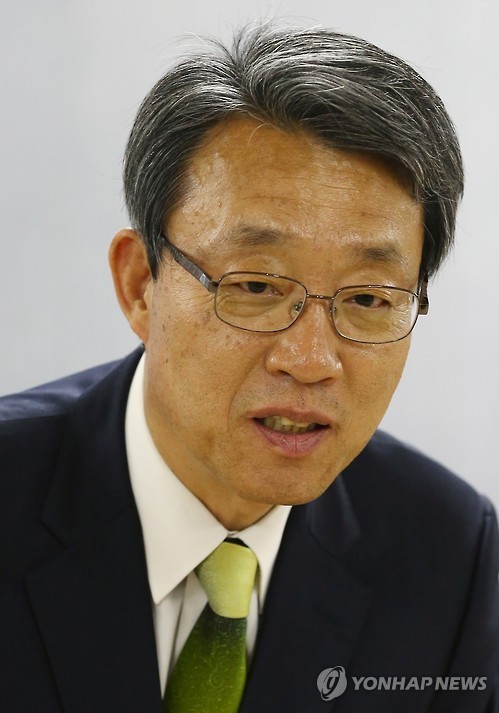Seeking to gain initiative in the upcoming 20th National Assembly, leading political parties are scrambling to seize the chairmanship of heavyweight parliamentary committees.
Due to the emergence of a new bargaining group -- the runner-up opposition People’s Party -- the allotment of key parliamentary posts this year is set to become an intricate tripartite competition.
Attention is also being paid to the anticipated members of key committees, particularly those dealing with economic agendas amid the accelerating talks of restructuring and economic revitalization.
Due to the emergence of a new bargaining group -- the runner-up opposition People’s Party -- the allotment of key parliamentary posts this year is set to become an intricate tripartite competition.
Attention is also being paid to the anticipated members of key committees, particularly those dealing with economic agendas amid the accelerating talks of restructuring and economic revitalization.

At the center of attention is Choi Woon-youl, proportional representative-elect of The Minjoo Party of Korea and top economic aide to party chief Kim Chong-in.
Having served as the party’s economic ideologue during the election season, Choi is forecast to keep a critical eye on the government’s economic policies.
Having served as the party’s economic ideologue during the election season, Choi is forecast to keep a critical eye on the government’s economic policies.

His ruling camp counterpart is Saenuri Party’s Lee Hye-hoon, who represented the party in the strategy and finance committee in the 18th National Assembly. An advocate of the idea of economic democratization, sharp-tongued Lee is expected to act as a strategic shield for the ruling party against the opposition camp’s economic policy map.
Their likely rival from the People’s Party is expected to be economist-turned-politician Kim Song-sik.
Their likely rival from the People’s Party is expected to be economist-turned-politician Kim Song-sik.

The ruling party is not only determined to safeguard its stronghold national defense and intelligence committees, but is also aspiring for the chairmanship of the legislation and judiciary committee, a post typically allocated to the leading opposition.
Holding the final screening authority on submitted bills before they reach the general meeting, the committee is considered a counterbalancing tool against the parliamentary speaker and the ruling party.
But having slipped to being the No. 2 party as result of the April 13 general election and having thus lost the parliamentary speaker post to the Minjoo Party, the Saenuri Party now has reason to eye the legislation committee as a strategic alternative.
“It would be preferable if we could chair the legislation and judiciary committee for the sake of power balance, but the opposition is unlikely to yield,” said Rep. Won Yoo-chul, floor leader and interim chief of the ruling conservative Saenuri Party on Sunday.
Won also staked the party’s claim to the chairmanship of the parliamentary steering committee, while gesturing at conceding the economic and social committees to the opposition bloc.
The Minjoo Party generally assents to the idea of taking the economic and social committees, while leaving the national security sector to the ruling party.
“The ruling party will not give up (the committees on) national defense, foreign affairs and unification, in which case we should be given control over the economy and social affairs,” said an official from the party.
Its list of aspired sectors includes state affairs, health and welfare and land and transport.
The party, however, argued that the legislation committee should be left for the opposition’s share, regardless of the number of parliamentary seats.
The best scenario for the Minjoo Party is to chair both the steering and legislation committees -- the former to create synergy with the incoming parliamentary speaker and the latter to prevent the ruling party’s monopoly.
“But we need to negotiate further with the People’s Party, so will leave the issue open for the forthcoming floor leadership,” the official said.
The No. 3 party has its eye on committees that may appeal to its stronghold Gwangju and Chungcheong provinces, where it won 23 out of 25 regional parliamentary seats.
“We hope to win control over the food and trade committees, both crucial in improving the livelihoods in the Honam region,” said the party’s policy chief Rep. Chang Byoung-wan.
“The legislation committee is for the opposition so we will negotiate (with the Minjoo Party) on detailed allocations.”
Amid escalating competition, some claimed the current 18-committee structure should be broken down further in order to optimize issue specialty.
“Environment and labor are two disparate sectors, with no mutually beneficial relations,” said Rep. Kweon Seong-dong, Saenuri Party representative for the environment and labor committee.
“Environmental issues may form a better balance and synergy when integrated with the land and transportation committee.”
Similar suggestions have been made on comprehensive groups such as the education, culture, sports and tourism committee and the future planning, creative science, communications committee.
By Bae Hyun-jung (tellme@heraldcorp.com)
Holding the final screening authority on submitted bills before they reach the general meeting, the committee is considered a counterbalancing tool against the parliamentary speaker and the ruling party.
But having slipped to being the No. 2 party as result of the April 13 general election and having thus lost the parliamentary speaker post to the Minjoo Party, the Saenuri Party now has reason to eye the legislation committee as a strategic alternative.
“It would be preferable if we could chair the legislation and judiciary committee for the sake of power balance, but the opposition is unlikely to yield,” said Rep. Won Yoo-chul, floor leader and interim chief of the ruling conservative Saenuri Party on Sunday.
Won also staked the party’s claim to the chairmanship of the parliamentary steering committee, while gesturing at conceding the economic and social committees to the opposition bloc.
The Minjoo Party generally assents to the idea of taking the economic and social committees, while leaving the national security sector to the ruling party.
“The ruling party will not give up (the committees on) national defense, foreign affairs and unification, in which case we should be given control over the economy and social affairs,” said an official from the party.
Its list of aspired sectors includes state affairs, health and welfare and land and transport.
The party, however, argued that the legislation committee should be left for the opposition’s share, regardless of the number of parliamentary seats.
The best scenario for the Minjoo Party is to chair both the steering and legislation committees -- the former to create synergy with the incoming parliamentary speaker and the latter to prevent the ruling party’s monopoly.
“But we need to negotiate further with the People’s Party, so will leave the issue open for the forthcoming floor leadership,” the official said.
The No. 3 party has its eye on committees that may appeal to its stronghold Gwangju and Chungcheong provinces, where it won 23 out of 25 regional parliamentary seats.
“We hope to win control over the food and trade committees, both crucial in improving the livelihoods in the Honam region,” said the party’s policy chief Rep. Chang Byoung-wan.
“The legislation committee is for the opposition so we will negotiate (with the Minjoo Party) on detailed allocations.”
Amid escalating competition, some claimed the current 18-committee structure should be broken down further in order to optimize issue specialty.
“Environment and labor are two disparate sectors, with no mutually beneficial relations,” said Rep. Kweon Seong-dong, Saenuri Party representative for the environment and labor committee.
“Environmental issues may form a better balance and synergy when integrated with the land and transportation committee.”
Similar suggestions have been made on comprehensive groups such as the education, culture, sports and tourism committee and the future planning, creative science, communications committee.
By Bae Hyun-jung (tellme@heraldcorp.com)
-
Articles by Korea Herald



![[Herald Interview] 'Amid aging population, Korea to invite more young professionals from overseas'](http://res.heraldm.com/phpwas/restmb_idxmake.php?idx=644&simg=/content/image/2024/04/24/20240424050844_0.jpg&u=20240424200058)


![[Pressure points] Leggings in public: Fashion statement or social faux pas?](http://res.heraldm.com/phpwas/restmb_idxmake.php?idx=644&simg=/content/image/2024/04/23/20240423050669_0.jpg&u=)












